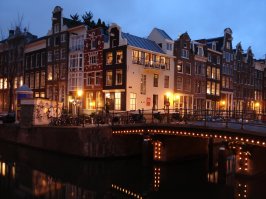I often find myself in this peculiar state as if I am caught in between 2 worlds: the one of my home culture, its norms and practices, and the one of my “acquired” habitat, that is, the Western perspective on things and manners. It is peculiar because it feels like I can relate to both of them and because of that I do not fully belong to either. On my recent trip to Russia I was reminded of this rather awkward position once again, when it came to conversations on marriage in general and marital status of my acquaintances’ from all over the world in particular. To sum them up, lots of people who I graduated from high school with are either already married or almost engaged, so as to being single or not committed to a serious relationship (whatever you imply by this) is the exception. Quite a few of these guys already have children, even though they are barely 23 (in some cases, 24) years old! This fact amazes, to say at least, my friends from Europe and North America. Their life choices at the same age are completely different despite numerous similarities in lifestyle; most of them are still in school pursuing BA and MA degrees and do not have apparent plans to settle down any time soon. Instead, they seek to try out many things and gain various experiences, which includes traveling, moving around, perhaps even working abroad for a bit and completing some internships before embarking on something “serious”. I find such an obvious gap between these two paths very intriguing yet not completely surprising, because when it comes to comparative analysis common ground is highly important. My Russian peers and their Western counterparts clearly do not have it, both in the sense of mentality and socio-economic background, although on the surface level many things seem to be deceiving: many of these people share interests and hobbies, they seem to spend free time doing same things, and so on. What differs so drastically hence leading to completely different outcomes is the context of their lives.
What I am about to say is, by all means, one big generalization and I would usually avoid doing this, but for the purpose of this post it will do. But please do bear in mind that I am, too, aware of how diverse this co-called “West” is, so my point of reference is a sort of average view, perhaps, even a stereotypical perspective, First I would like to point out some notions that I associate with people of my age in the West. Since it is mainly made up of societies that are usually characterized by sociologists and psychologists as “individualist” (Dutch scholar Geert Hofstede has written remarkable works on the subject) , it does not come as a surprise that these guys are a bit more self-oriented, thus worshipping independence and doing what one’s heart desires combined with taking advantage of available opportunities. Of course, it is necessary to mention that this set of ideas is also backed up by local economies/governments in the form of student loans of all kinds, free stuff/services for students and youth until a certain age or even “free scholarships” (if you are familiar with the Dutch education system, think of “stufie”) as well as good part-time employment opportunities. That said, parents quite often do not provide much financial support to their children once they turn 18, and once you’ve reached that age it is up to you what to do next and how to do it. End of story? Not yet. This practice comes hand in hand with the idea that while you are young aka wild and free, you should go out there to see the world, experiment and just enjoy yourself. Doesn’t look like marriage fits right in there, does it?
Now, things in Russia are pretty different. This society is commonly considered as “collectivist”, which stands for a kind of culture where the social institution or group is prioritized higher than the individual self. It is also safe to say that Russian society is conservative and even judgmental if certain things aren’t done “right”. I believe this has a lot to do with our communist past, and our parents who all grew up in that era passed this approach to life on to next generation – us. At the same time, students and young people there cannot really count on any financial aid from the government except scholarships for excellent academic performance , but even this support is often insufficient to live off just it. Besides that but not necessarily because of that, it is often the case that parents financially support their children throughout their student years until graduation. Upon completion of studies, however, one is expected to find a full-time job and settle in order to make a living by him/herself without further income from parents (unless there is some sort of emergency). So, while student life in Russia, Europe, and North America is pretty much the same, graduation marks the point where paths turn in completely different directions. I can hardly imagine a recent grad from my Motherland taking off on a world trip using their savings not even because of the money but because you are supposed to get all serious once out of school. Don’t get me wrong though, it does not mean that everyone basically follows the same order of life events or milestones (although in the grand scheme of things it certainly looks so), but rather that there are certain ideas that the majority agrees upon, finding your significant other early on being one of them. You aren’t quite supposed to joke around at that age.
So is that it? Frankly speaking, I am not sure. Do my Western friends have fear of commitment or do they just prioritize personal needs? Or do my Russian peers just do what is considered “right”?



